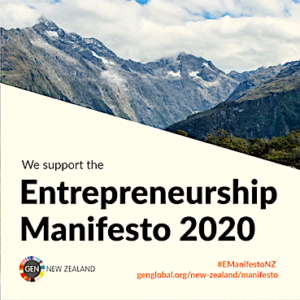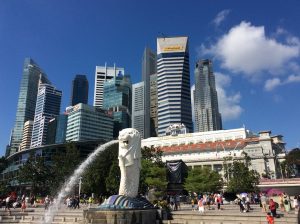 After nearly a decade of rebuilding, much of the baseline physical infrastructure needed for the regeneration of Christchurch is now in place. There’s still a lot more to do of course, but there’s now some breathing space to think about working on social infrastructure as well. Developing a vibrant and better connected local ecosystem will be the key to unlocking a wider pipeline of innovation across Canterbury.
After nearly a decade of rebuilding, much of the baseline physical infrastructure needed for the regeneration of Christchurch is now in place. There’s still a lot more to do of course, but there’s now some breathing space to think about working on social infrastructure as well. Developing a vibrant and better connected local ecosystem will be the key to unlocking a wider pipeline of innovation across Canterbury.
Building a more connected innovation community also demonstrably aligns with the city-wide Prosperity Framework established by economic development agency ChristchurchNZ in 2018. This framework underpins business attraction and capability building activities across the city for the following decade and is strongly informed by the United Nations Sustainable Development Goals (SDG) and the New Zealand government Treasury Living Standards Framework. Environmental sustainability, inclusion, scalability and confidence are therefore viewed as pillars of a recovering and strengthening city economy and are encapsulated within the adjacent Supernodes Strategy.
The Supernodes Strategy, in its current form, has a focus on four designated areas of Food/Fibre/Agritech, Aerospace, HealthTech and High Tech services. All of these areas are obviously predicated upon a well connected ecosystem that is strongly underpinned by world class capabilities in software, high tech manufacturing and research. But it is less clear where important and enabling innovation infrastructure itself sits within the strategy. For example, platform based digital services and game offerings are amongst the highest value and fastest growing companies globally. Should we consider creating a local niche to include these sectors?
The Supernode strategy also speaks strongly about inclusion, especially in cultivating diversity of thinking and about better engaging young people with the business community. The strategy seeks to achieve progress through “a collaborative approach between education, industry and the government…to ensure a prosperous future for the city and the region”. So actively building these bridges is a mandated priority.
Resilient infrastructure and fostering sustainable and inclusive innovation incidentally also forms the basis of SDG Goal 9, a global commitment that central government signed us up to. Supporting small business growth and facilitating investments in research and development are fundamental to this goal. This is especially salient in the context of a post-quake, post-Covid economic rebuild in Christchurch. So there are many brilliant reasons to foster connectivity across the innovator community in Canterbury. One of the strongest arguments for doing so is that there is plenty of untapped capacity, unlike in some of our other main centre cities.
Pandemic related disruption has unfortunately hindered community-building activities throughout much of 2020, but has ironically amplified the need for it more than ever. Community minded responses have thus far averted a public health crisis. In the meantime people in education and business found ways to keep working together. Maintaining and building robust, collaborative communities is more important than ever in the disrupted, remote working and rapidly changing world to which we must adapt.
Paul Spence is a commentator and serial entrepreneur, a recently exited co-founder of a New Zealand based technology venture, a co-founder and director of Creative Forest and principal at GeniusNet Research. You can follow Paul on Twitter @GeniusNet or sign up for a free weekly digest of startup, tech and innovation related events curated by him through New Zealand Startup Digest. Paul is a co-author of the Entrepreneurship Manifesto 2020.
Image credit: Renea Mackie

 What do a vegan Middle Eastern prince and a Singaporean cheese maker have in common? Not a joke. In fact it’s a rather serious question for New Zealand. Earlier this year Saudi based KBW Ventures invested over US $3 million in a “seed” round backing a company that claims to have developed a proprietary technology for producing milk from bovine mammary cells, by hosting the live cells within a laboratory bioreactor. The long term implications of this technology for the New Zealand economy are obvious.
What do a vegan Middle Eastern prince and a Singaporean cheese maker have in common? Not a joke. In fact it’s a rather serious question for New Zealand. Earlier this year Saudi based KBW Ventures invested over US $3 million in a “seed” round backing a company that claims to have developed a proprietary technology for producing milk from bovine mammary cells, by hosting the live cells within a laboratory bioreactor. The long term implications of this technology for the New Zealand economy are obvious. During the last few months a number of us from the entrepreneur enabler community have been working on a
During the last few months a number of us from the entrepreneur enabler community have been working on a  The pandemic induced economic crisis has raised awareness that economies remain fragile since the GFC and that we must urgently shift to more sustainable and environmentally sound forms of economic development if we are to survive as a species. As a nation in the spotlight right now, New Zealand has an opportunity to lead with change. But we need a vehicle to drive this process and we must shift the mindset of the nation towards environmental entrepreneurship.
The pandemic induced economic crisis has raised awareness that economies remain fragile since the GFC and that we must urgently shift to more sustainable and environmentally sound forms of economic development if we are to survive as a species. As a nation in the spotlight right now, New Zealand has an opportunity to lead with change. But we need a vehicle to drive this process and we must shift the mindset of the nation towards environmental entrepreneurship.
 This year has seen extreme heatwaves in Europe, numerous and more frequent devastating tropical storms across all of the world’s oceans and a record number of destructive bush fires in both Australia and North America. Politicians may not agree on the causes, but there is no doubt that climate change represents a huge risk to economies and quite possibly an existential threat to some nations altogether. But climate change action and reduction of CO2 in the atmosphere may require re-framing as an economic opportunity in order to make progress.
This year has seen extreme heatwaves in Europe, numerous and more frequent devastating tropical storms across all of the world’s oceans and a record number of destructive bush fires in both Australia and North America. Politicians may not agree on the causes, but there is no doubt that climate change represents a huge risk to economies and quite possibly an existential threat to some nations altogether. But climate change action and reduction of CO2 in the atmosphere may require re-framing as an economic opportunity in order to make progress. After missing the previous two events due to timetable clashes, the planets aligned and I finally made it to this year’s
After missing the previous two events due to timetable clashes, the planets aligned and I finally made it to this year’s  Instructing the Super Fund to channel
Instructing the Super Fund to channel  If you are a fan of romantic comedies you may recall a scene in last year’s hit movie Crazy Rich Asians in which friends join the happy couple at an outdoor food centre for an evening of laughs, beer and Singaporean food. Amerasian Rachel is trying her best to fit in but is caught off guard by a particularly spicy mouthful of Laksa, much to everyone’s amusement. In some ways this typifies the visitor experience in Singapore. At first it can be hard to find your place in the cultural melange, but there are surprises around every corner and people are friendly once you’ve been properly introduced – so it’s very much worth persisting.
If you are a fan of romantic comedies you may recall a scene in last year’s hit movie Crazy Rich Asians in which friends join the happy couple at an outdoor food centre for an evening of laughs, beer and Singaporean food. Amerasian Rachel is trying her best to fit in but is caught off guard by a particularly spicy mouthful of Laksa, much to everyone’s amusement. In some ways this typifies the visitor experience in Singapore. At first it can be hard to find your place in the cultural melange, but there are surprises around every corner and people are friendly once you’ve been properly introduced – so it’s very much worth persisting. Having
Having